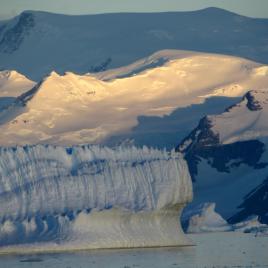A recent assessment of glacier flow in Western Palmer Land on the Antarctic Peninsula reveals that sea-ice loss in the region isn’t as drastic as previously reported. Using five different satellites, researchers tracked changes in the speed of more than 30 glaciers over the past 25 years. Their findings provide evidence that Western Palmer Land […]
Tag: climate change
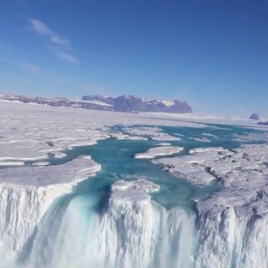
Survey charts meltwater and streams across Antarctica
For the first time ever, researchers have mapped out the movement of water across Antarctica in an intricate network of lakes and streams. Researchers catalogued satellite images and aerial photographs of the continent starting from the late 1940s. In their analysis of the images, researchers found nearly 700 seasonal systems of interconnected ponds, channels and […]
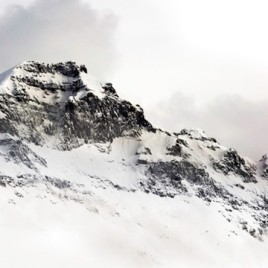
Natural and anthropogenic influences led to mountain snow loss in Western United States 
Both natural and anthropogenic factors have led to the decrease of snowcaps on the Western US mountains, a recent study concludes. Study authors simulated snowpack conditions by using a climate model in two configurations: one with contributions only from natural variability; and a second with contributions from both natural variability and anthropogenic activities. Researchers found the […]
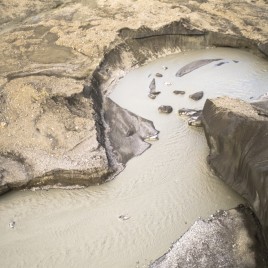
Retreating glacier is making a Yukon river disappear 
The melting of a massive glacier is changing the course of a Yukon river, new study finds. Meltwater from the retreating Kaskawulsh Glacier, which used to flow through the Slims River in Kluane National Park, is now flowing through a different river. This is the first modern case of “river piracy,” a phenomenon where the […]

Biofuels help reduce emissions from airplanes at cruise conditions 
A mixture of biofuel and conventional fuel reduces airplane emissions by 50 to 70% compared to conventional fuel, according to the first ever in-flight study of biofuel aerosol emissions. Researchers measured aerosol emissions from an aircraft flying behind the test plane, a technique that provided more accurate results than ground tests. Aerosols released by plane engines in-flight […]

SMCC Webinar: Water in a Changing Climate
Water is our lifeline and also a humbling force of nature. As the climate changes, the decisions we make today regarding water will determine our country’s success over the coming decades. SMCC in partnership with Environment and Climate Change Canada brought together researchers and policy makers to describe what the future may hold for this essential […]
80% of the world’s oceans would be affected by climate change by 2050
Four-fifths of the world’s marine ecosystems will be irreversibly damaged by 2050 if no immediate action is taken, a new study concludes. Researchers ran simulations to determine the effect of climate change on the main stressors of the ocean’s ecosystems—such as pH, temperature, oxygen concentration and food availability. If conditions remain as they are, in […]
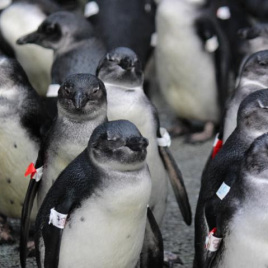
Thanks to climate change, baby African penguins are looking for food in the wrong places
For hundreds of years, young African penguins came of age by travelling long distances to southern Angola and South Africa’s Western Cape in search of food. Certain signs, like lower sea surface temperatures and higher chlorophyll concentrations, have reliably led young penguins to areas abundant in anchovies and sardines. But recent changes in climate and […]

SMCC Webinar | Building Resilience to Climate Change: Evidence Based Strategies for Healthier Cities
Climate change is affecting Canada’s weather, changing not only the temperature, but also the quality of the air we breathe. Evidence suggests these changes may pose a serious threat to public health, especially for certain vulnerable populations in urban areas. With over 80% of Canadians living in urban settings, there is an urgent need to […]
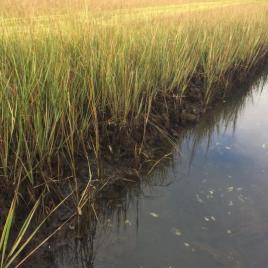
Coastal wetlands help soak up harmful greenhouse gases
A new study suggests that coastal wetland ecosystems such as mangrove forests, tidal marshes and seagrass meadows are great at mitigating negative effects of greenhouse gases. To study how effectively each marine ecosystem utilizes greenhouse gases, researchers evaluated how CO2 is stored within the system and for how long. Their estimations suggest that mangrove […]
Ocean acidification effects differ depending on the species’ sex 
Ocean acidification (OA) occurs with the increase of human-made carbon dioxide in the waters. The impacts of acidification on marine ecosystems have been studied extensively over the past decade, but little research has been done to look at intraspecific differences in reaction to increased CO2 levels. The present study reviews all data collected about the […]
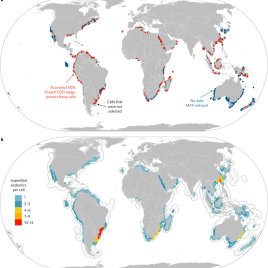
Marine protected areas need expansion to prevent shark, ray and chimera extinction 
Marine protected areas (MPAs) are established all over the world to help preserve imperiled species. But the process of identifying these areas doesn’t always prioritize species most at risk of extinction. A new study focuses specifically on the endangered chondrichthyans (such as sharks, rays and chimeras) and their representation in the existing MPA network. Results […]
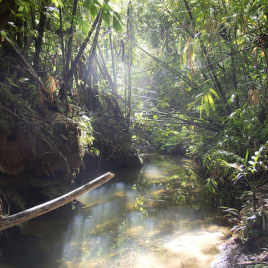
Effects of climate change on the inhabitants of Borneo’s tropical rainforests 
As global temperatures rise, unique ecosystems within tropical rainforests need to adapt to the changes. A new study looked at several species’ activity at each hour at each location on the landscape and projected how the spatio-temporal habits might change in a warmer environment. Results predicted a negligible effect on large animals; but smaller animals, […]
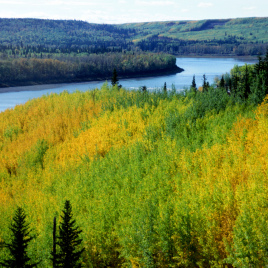
Warmer temperatures and increased CO2 levels don’t stimulate tree growth 
Warmer temperatures and higher levels of carbon dioxide associated with climate change were supposed to bode well for tree growth. But a recent study shows that this advantage isn’t seen in the trees of Canadian boreal forests. Researchers collected and analyzed tree-ring data and satellite images to determine how the changing temperatures and CO2 emissions […]
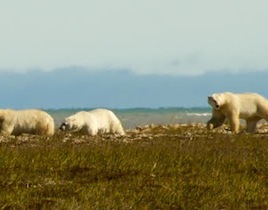
As levels of sea-ice decline, so do polar bear populations 
The Arctic sea-ice is vital to polar bears’ hunting and breeding habits. So it comes as no surprise that the decline in sea-ice as a result of anthropogenic climate change has a great effect on the polar bear populations. An international team of researchers further demonstrated this vital relationship by calculating probability in population decrease […]
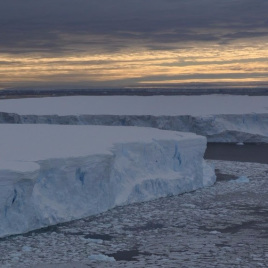
Retreat of the fastest melting glacier in Antarctica began in 1945
The loss of ice on Pine Island Glacier makes up about a quarter of Antarctica’s melt, and a new study pinpointed the source of its fast retreat to the El Nino event of 1945. Using dating techniques, an international team of researchers studied sediment cores from the glacier’s floating ice shelf. They discovered that the […]
